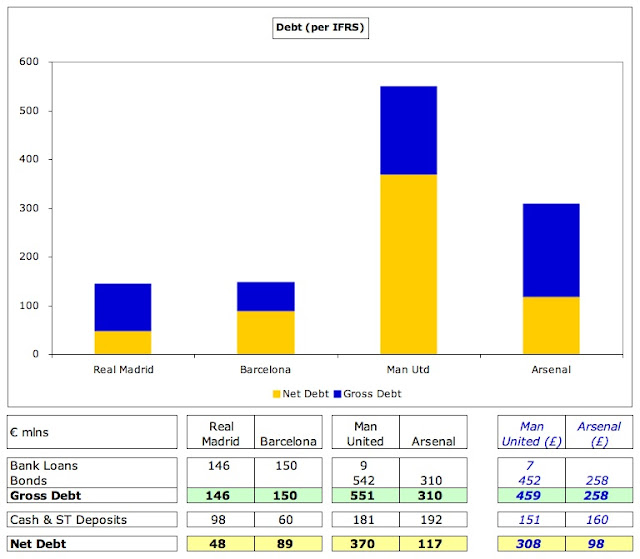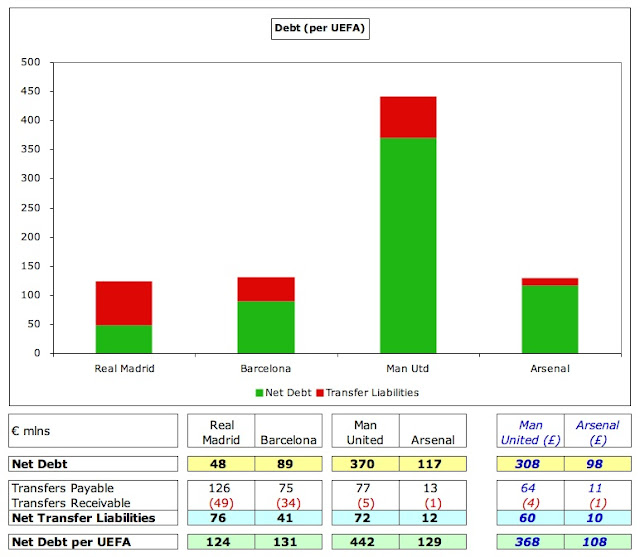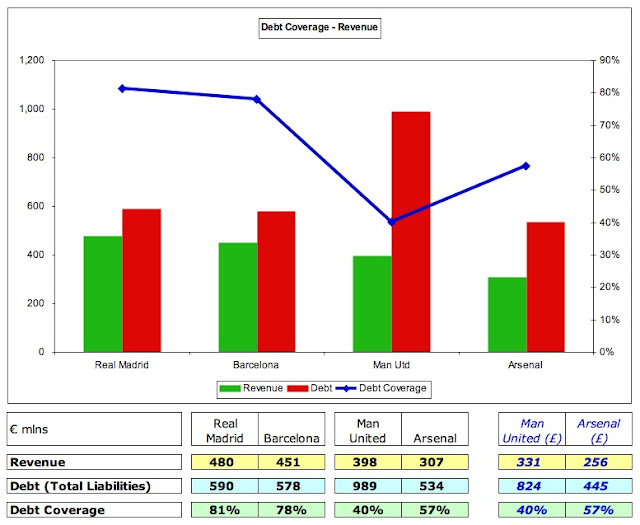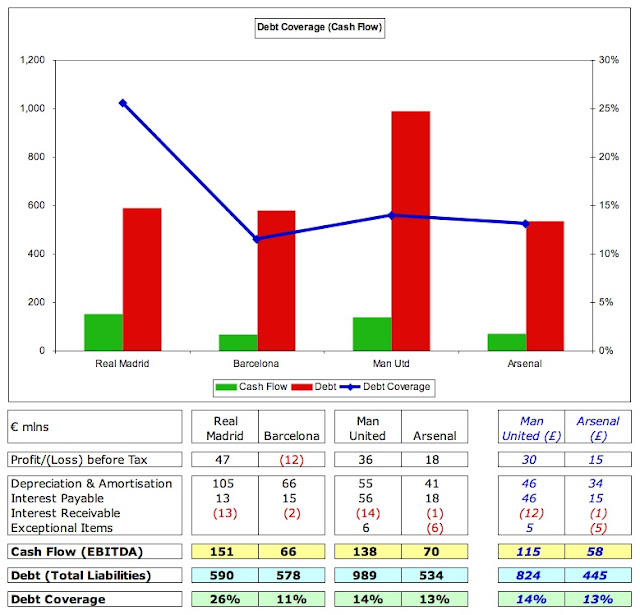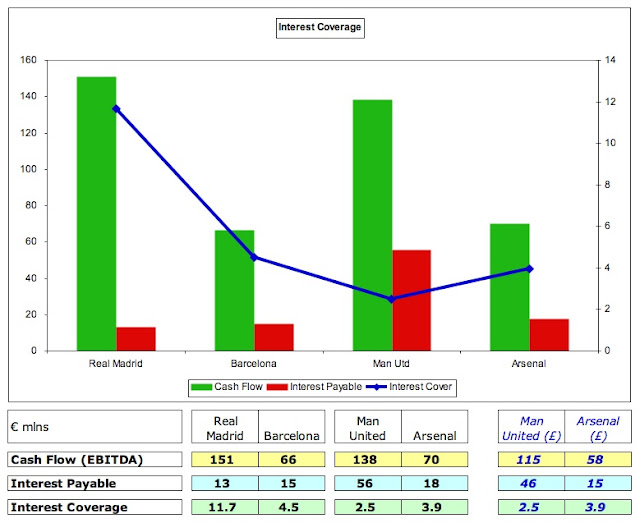JerusalemMan
Jimmy McCormick
This was a good and insightful read.
It is from a Gooner site but they seem to have done their homework.
http://blog.emiratesstadium.info/archives/30010?
In July, after months of prevarication Government in Spain finally revealed that it is owed €663,876,441 in overdue tax by football clubs in the top two divisions.
This is of course just another issue in a country whose economy is in a state somewhat worse that Bongo-Bongo (a country revived by the UK political party UKIP as a symbol of a land whose economy is out of control).
But Spain is not just Bongo-Bongo in Europe, it is also something else. Because Spain gets European Union bailout grants which are heading towards €100bn.
Now of course this will all be gibberish to the good men of BT Sports who, as reported at the weekend, cannot add 3 plus 3, but for the rest of the population, it is a matter of interest, not least because of this little fact…
That total sum does NOT (may I repeat that, NOT) include four clubs which are exempt from reporting such matters under a 1990 law within which they do not have to operate as public limited companies (the “plc” and “Ltd” companies in the UK) but are “socios” – effectively not controlled by or answerable to the tax authorities!
Now, you may ask, who are these lucky devils (and if you are in business, you might add “and how can I turn my company into one of these?”)
Here’s the answer: Real Madrid, Barcelona, Athletic Bilbao and Osasuna. Tellingly the Government of Spain would not disclose the debt that these four owed the government. To say the EU is not amused is to put it lightly – not least now the EU is investigating what we might once again call “Spanish Practices”
If you have been a regular reader of Untold you’ll know we’ve been pushing away at the Real Madrid and Barcelona issues since we started, both because most of us associated with the site believe that companies should pay tax, and because it is patently clear that these two clubs have an utterly unfair advantage over other Spanish clubs (not really our concern) and non-Spanish clubs (very much our concern as Arsenal fans).
The issue of Real Madrid and Barcelona is simple. Spain is broke, the economy is bust, the only job opportunities that are booming are in prostitution, and recorded unemployment is over 26%. And…
Barcelona is teetering on the financial brink (as when it failed to pay its players three summers back, and “solved” the crisis by stating that they were banning the use of the colour photocopier). Real Madrid continues to claim that it can buy players at world record prices, and then pay for this with shirt sales. (It is a ludicrous assertion of course but dutifully Untold actually did the sums in an article we published when C Ronaldo went to the club, to show how fake the assertion was).
Things are looking bad for Real Mad, as after years of procrastination the issue of state aid for the club is being investigated by the EU, as is the land deal in which effectively a piece of waste land on the edge of the city owned by the club and worth €421,000 in 1998 was effectively exchanged with the Council in 2011 for land worth €22.7m.
Michel Platini managed to get EC competitions commissioner, Joaquin Almunia, himself a Real Madrid fan, to sign the statement making the use of illegal state aid to football clubs as making a club fail FFP arrangements.
In a recent article the Independent newspaper suggested the total debt of clubs in the top league in Spain is €4.1bn – a debt that is utterly unsustainable in terms of interest payments, and totally unrepayable – which by and large loans are supposed to be. As a result clubs are finding that for the first time in a long time, players want to get out of Spain as everyone waits for more developments of the type we saw when Málaga failed to meet its commitments. Salamanca has also gone. Others are on the edge.
TV subscriptions are falling fast, and there is talk of changing the times of TV games to fit in with the Asian market. Digital+ has lost 15 per cent of subscribers in the last year and Mediapro, which has closed down one of its channels, is 25 per cent down in the last two years.
Of course the clubs are doing everything possible to put a spin on their situation – and the fact that some people actually believe that players like Bale can be paid for in shirt sales shows how gullible some supporters – and indeed journalists – are.
Likewise the fact that Atletico Madrid can put up a silly bid for Santi Cazorla, and have it reported all over the press shows how successful Spanish clubs are at pulling the wool over the bleary eyes of pub-based journalists. No one mentioned that as the club allegedly put in the bid, they did so from a base of a debt of €180m. Even the sale of Radamel Falcao to Monaco for €60m didn’t help much since they had already sold the rights to the player in an attempt to stave off closure.
“Investment group participation” as this part selling is known (which is banned in most countries) is now openly used as the only way to meet the Secretary of State for Sport’s requirement that €1,000m to be removed from the top two division’s debt over the next three years.
Valencia (5th last year) owe over €300m. Malaga are banned from European football and players are starting to take action over unpaid wages. 24 clubs in the top two divisions have entered administration in the past four years. Sevilla play in the Europa League this year because Rayo Vallecano, who finished above them last season, are banned by Uefa because of their finances. Deportivo owe €156m, have been relegated and are on the financial cliff edge. Likewise Racing Santander.
Meanwhile the “Beckham Law” that put foreign players in a low tax bracket has gone, banks (now firmly supervised by the EU as part of the EU loan deal) no longer lend clubs money. It is all coming to an end.
So, what of Bale and Real Madrid? When Arsenal sold Nic Anelka to Real Madrid there were multiple problems in getting the money out of the club. And that was long before any of this started. Real Mad will want to pay the Bale money (if the deal goes through) over five years, in the hope that over time all the little local difficulties will have gone, and no one will be looking at their accounts any more.
But there is every chance that this won’t happen, and that Real will start renegotiating its debts early next year. Because of this it is likely that we are now at the very peak of player prices. A whole range of factors could reduce prices from next January onwards.
It is from a Gooner site but they seem to have done their homework.
http://blog.emiratesstadium.info/archives/30010?
In July, after months of prevarication Government in Spain finally revealed that it is owed €663,876,441 in overdue tax by football clubs in the top two divisions.
This is of course just another issue in a country whose economy is in a state somewhat worse that Bongo-Bongo (a country revived by the UK political party UKIP as a symbol of a land whose economy is out of control).
But Spain is not just Bongo-Bongo in Europe, it is also something else. Because Spain gets European Union bailout grants which are heading towards €100bn.
Now of course this will all be gibberish to the good men of BT Sports who, as reported at the weekend, cannot add 3 plus 3, but for the rest of the population, it is a matter of interest, not least because of this little fact…
That total sum does NOT (may I repeat that, NOT) include four clubs which are exempt from reporting such matters under a 1990 law within which they do not have to operate as public limited companies (the “plc” and “Ltd” companies in the UK) but are “socios” – effectively not controlled by or answerable to the tax authorities!
Now, you may ask, who are these lucky devils (and if you are in business, you might add “and how can I turn my company into one of these?”)
Here’s the answer: Real Madrid, Barcelona, Athletic Bilbao and Osasuna. Tellingly the Government of Spain would not disclose the debt that these four owed the government. To say the EU is not amused is to put it lightly – not least now the EU is investigating what we might once again call “Spanish Practices”
If you have been a regular reader of Untold you’ll know we’ve been pushing away at the Real Madrid and Barcelona issues since we started, both because most of us associated with the site believe that companies should pay tax, and because it is patently clear that these two clubs have an utterly unfair advantage over other Spanish clubs (not really our concern) and non-Spanish clubs (very much our concern as Arsenal fans).
The issue of Real Madrid and Barcelona is simple. Spain is broke, the economy is bust, the only job opportunities that are booming are in prostitution, and recorded unemployment is over 26%. And…
Barcelona is teetering on the financial brink (as when it failed to pay its players three summers back, and “solved” the crisis by stating that they were banning the use of the colour photocopier). Real Madrid continues to claim that it can buy players at world record prices, and then pay for this with shirt sales. (It is a ludicrous assertion of course but dutifully Untold actually did the sums in an article we published when C Ronaldo went to the club, to show how fake the assertion was).
Things are looking bad for Real Mad, as after years of procrastination the issue of state aid for the club is being investigated by the EU, as is the land deal in which effectively a piece of waste land on the edge of the city owned by the club and worth €421,000 in 1998 was effectively exchanged with the Council in 2011 for land worth €22.7m.
Michel Platini managed to get EC competitions commissioner, Joaquin Almunia, himself a Real Madrid fan, to sign the statement making the use of illegal state aid to football clubs as making a club fail FFP arrangements.
In a recent article the Independent newspaper suggested the total debt of clubs in the top league in Spain is €4.1bn – a debt that is utterly unsustainable in terms of interest payments, and totally unrepayable – which by and large loans are supposed to be. As a result clubs are finding that for the first time in a long time, players want to get out of Spain as everyone waits for more developments of the type we saw when Málaga failed to meet its commitments. Salamanca has also gone. Others are on the edge.
TV subscriptions are falling fast, and there is talk of changing the times of TV games to fit in with the Asian market. Digital+ has lost 15 per cent of subscribers in the last year and Mediapro, which has closed down one of its channels, is 25 per cent down in the last two years.
Of course the clubs are doing everything possible to put a spin on their situation – and the fact that some people actually believe that players like Bale can be paid for in shirt sales shows how gullible some supporters – and indeed journalists – are.
Likewise the fact that Atletico Madrid can put up a silly bid for Santi Cazorla, and have it reported all over the press shows how successful Spanish clubs are at pulling the wool over the bleary eyes of pub-based journalists. No one mentioned that as the club allegedly put in the bid, they did so from a base of a debt of €180m. Even the sale of Radamel Falcao to Monaco for €60m didn’t help much since they had already sold the rights to the player in an attempt to stave off closure.
“Investment group participation” as this part selling is known (which is banned in most countries) is now openly used as the only way to meet the Secretary of State for Sport’s requirement that €1,000m to be removed from the top two division’s debt over the next three years.
Valencia (5th last year) owe over €300m. Malaga are banned from European football and players are starting to take action over unpaid wages. 24 clubs in the top two divisions have entered administration in the past four years. Sevilla play in the Europa League this year because Rayo Vallecano, who finished above them last season, are banned by Uefa because of their finances. Deportivo owe €156m, have been relegated and are on the financial cliff edge. Likewise Racing Santander.
Meanwhile the “Beckham Law” that put foreign players in a low tax bracket has gone, banks (now firmly supervised by the EU as part of the EU loan deal) no longer lend clubs money. It is all coming to an end.
So, what of Bale and Real Madrid? When Arsenal sold Nic Anelka to Real Madrid there were multiple problems in getting the money out of the club. And that was long before any of this started. Real Mad will want to pay the Bale money (if the deal goes through) over five years, in the hope that over time all the little local difficulties will have gone, and no one will be looking at their accounts any more.
But there is every chance that this won’t happen, and that Real will start renegotiating its debts early next year. Because of this it is likely that we are now at the very peak of player prices. A whole range of factors could reduce prices from next January onwards.

